‘UKAid’ to replace DfID overseas
By Alex Stevenson
Douglas Alexander has defended his department’s decision to rebrand its aid efforts overseas.
The international development secretary said the move was designed to improve awareness of Britain’s involvement in aid projects. ‘UKAid’ will prove more recognisable than ‘DfID’ (Department for International Development), today’s white paper shows.
“This white paper sets out our plans to do more to show the UK public how government assistance is helping to fight poverty, including through the use of a new ‘UKAid’ logo, to increase the visibility of our work,” he told MPs.


It follows calls by backbenchers to change the name. International development committee chairman Malcolm Bruce told the Independent: “The problem is that the name DfID does not reflect the fact that this is a British organisation. It could be anything.”
Shadow international development secretary Andrew Mitchell expressed reservations at the move, saying: “In this age of austerity, spending on rebranding will be very carefully scrutinised.”
But Mr Alexander stood by the move. While admitting that “DfID has perhaps in the past been the best kept secret of the government”, he said the new logo would “resonate with the British public in time”.
The new logo, to be plastered on deliveries of aid paid for by British taxpayers, has been welcomed by development charity ActionAid.
Its UK director Richard Miller said: “If the logo helps increase understanding of and solidarity with communities tackling poverty and injustice in the developing world, that can only be a good thing and empowering for all concerned.”
Security experts have criticised DfID for not coordinating well with other government departments in areas like Afghanistan.
But the department believes it is doing well in distributing Britain’s aid and has built a strong reputation overseas for its operations.
In today’s white paper Mr Alexander revealed the government planned to reach its millennium development goal of spending 0.7 per cent of GDP on aid by 2013, two years before the UN’s deadline.
Liberal Democrat spokesman Michael Moore said in the absence of a comprehensive spending review or strategic defence review how such a commitment would be met was unclear, but backed the “huge moral responsibilities” of developed countries to deliver aid.
Mr Mitchell also welcomed the report, especially because he claimed Tory ownership over many of its proposals.
He called for a “dramatic improvement in the effectiveness of our aid”.
Mr Alexander said the government had not accepted all the Conservatives’ ideas.
Among the announcements were plans to help over eight million more children in Africa go to school, double funding for African infrastructure to £1 billion and a tripling of funding to help improving policing against corruption in developing countries.












